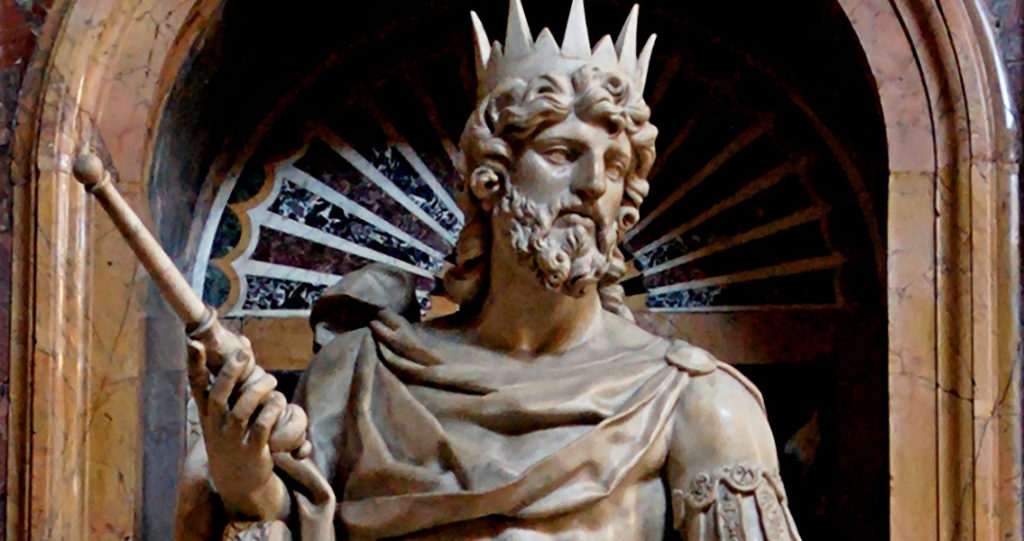Your love, Lord, reaches to the heavens, your faithfulness to the skies. Your righteousness is like the highest mountains, your justice like the great deep. You, Lord, preserve both people and animals. How priceless is your unfailing love, O God! People take refuge in the shadow of your wings. -Psalm 36: 5-7
God’s love was hard to miss and yet sometimes people missed it or turned away — sometimes I did too. But why? I knew God was sovereign and would do as He pleased, but did he use affliction and sin to draw us closer? That was sure how it had worked for me, but still I wondered, did He ever cause it? Perhaps affliction and sin were not only the natural consequences of turning away from God, but also the way God drew close to us. This was starting to make sense.
The History of the Jewish nation and the story of David both offer examples of God’s love and power. They are examples of how people respond to God and how God responds to people. These stories are historical treasures and lessons in both faithfulness and spiritual transformation, lessons that still speak truth and power into the lives of people today!
Israel cried out to God:
Remember, Lord, what has happened to us; look, and see our disgrace. Our inheritance has been turned over to strangers, our homes to foreigners. We have become fatherless, our mothers are widows. We must buy the water we drink; our wood can be had only at a price. Those who pursue us are at our heels; we are weary and find no rest. We submitted to Egypt and Assyria to get enough bread. Our ancestors sinned and are no more, and we bear their punishment. Slaves rule over us, and there is no one to free us from their hands. -Lamentations 5:1-8
Despite being chosen by God to be a holy nation and despite God’s frequent demonstration of his love, Israel turned away from God over and over. Their sin of disobedience resulted in affliction that many times led to repentance and reconciliation. When the Israelites were “on track” with God, His grace came in the blessings of provision and remarkable victories over powerful foes.
The stories of God’s anointing of Saul and Saul’s disobedience, when compared to David and his adulatory and act of murder, are in stark contrast to each other. Despite David’s transgressions, because he never stops trusting and loving God, he has a different outcome than Saul who turns away from God, eventually in arrogance and self righteousness as God’s Holy Spirit retreats along with His blessings. On the other hand, David’s faithfulness leads to his forgiveness by God who “washes him white as snow” and separates him from his sin, “as far as the East is from the West.”
The Lord said to Samuel, “How long will you mourn for Saul, since I have rejected him as king over Israel? Fill your horn with oil and be on your way; I am sending you to Jesse of Bethlehem. I have chosen one of his sons to be king.” -1 Samuel 16:1
In the examples of David and Saul, it sure looks like, if we remain faithful, God remains with us, despite our shortcomings. But our permanent separation from God appeared to be a possible consequence if we turned our backs on God. This was true with Pharaoh, and Saul, and even Israel. God in His sovereignty reserves the right to take back the gift of “free will”, which could allow our hearts to harden. I certainly didn’t want that to happen to me, but what if in my hesitancy it was possible?
Today’s reading: 1 Samuel 20; 1 Corinthians 2; Lamentations 5; Psalm 36
I often wondered how God’s wisdom was revealed? And how could I know God’s spirit? Often this seemed beyond my understanding. And then there were times when I felt God’s presence so powerfully I couldn’t believe I ever favored my prescription for happiness over God’s. But without the stark contrasts in my life, would I have been able to understand my relationship to God? The list of thoughts and words and deeds that I had chosen that “grieved” the Holy Spirit were too long to list, and yet God still poured His Holy Spirit into me when I turned to Him, when I asked. I was so moved by God’s Grace it literally brought me to my knees.
However, as it was written: “What no eye has seen, what no ear has heard, and what no human mind has conceived”—the things God has prepared for those who love him— these are the things God has revealed to us by his Spirit. The Spirit searches all things, even the deep things of God. -1 Corinthians 2:9-10
Somehow I knew, if I sought God’s will above my own, it would be revealed. I would never know the depth of God’s love and wisdom if I continued to pursue my own understanding and worldly wisdom. I knew I had to change. I was changing.
Somehow I learned that life was so much more than being cool and having fun. As cool and fun as that was, it often became the “honey pot” that distracted me from finding real treasure, a treasure more vast and magnificent than any I ever imagined.
This is what I hungered for. This is what I found. Thank you Jesus.



